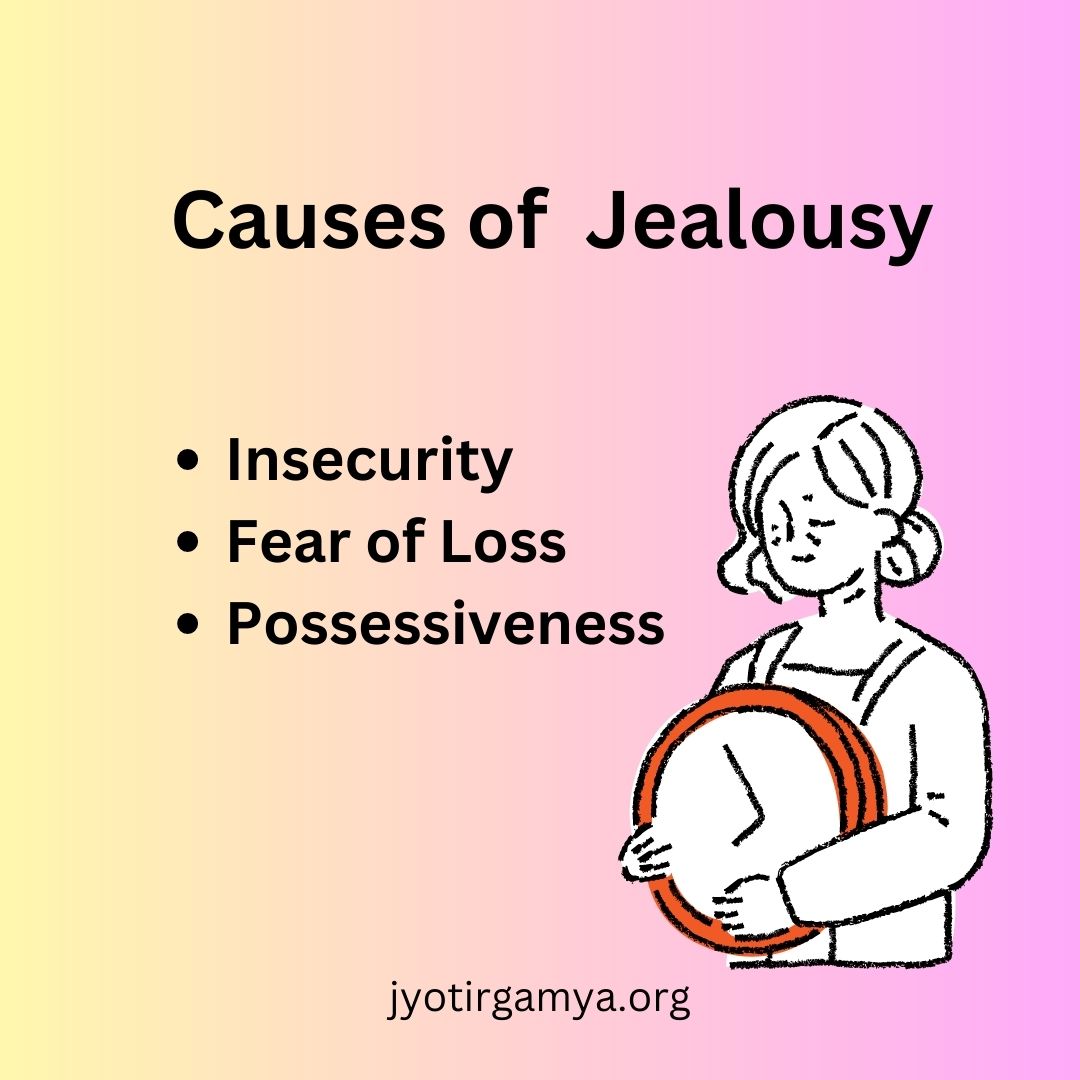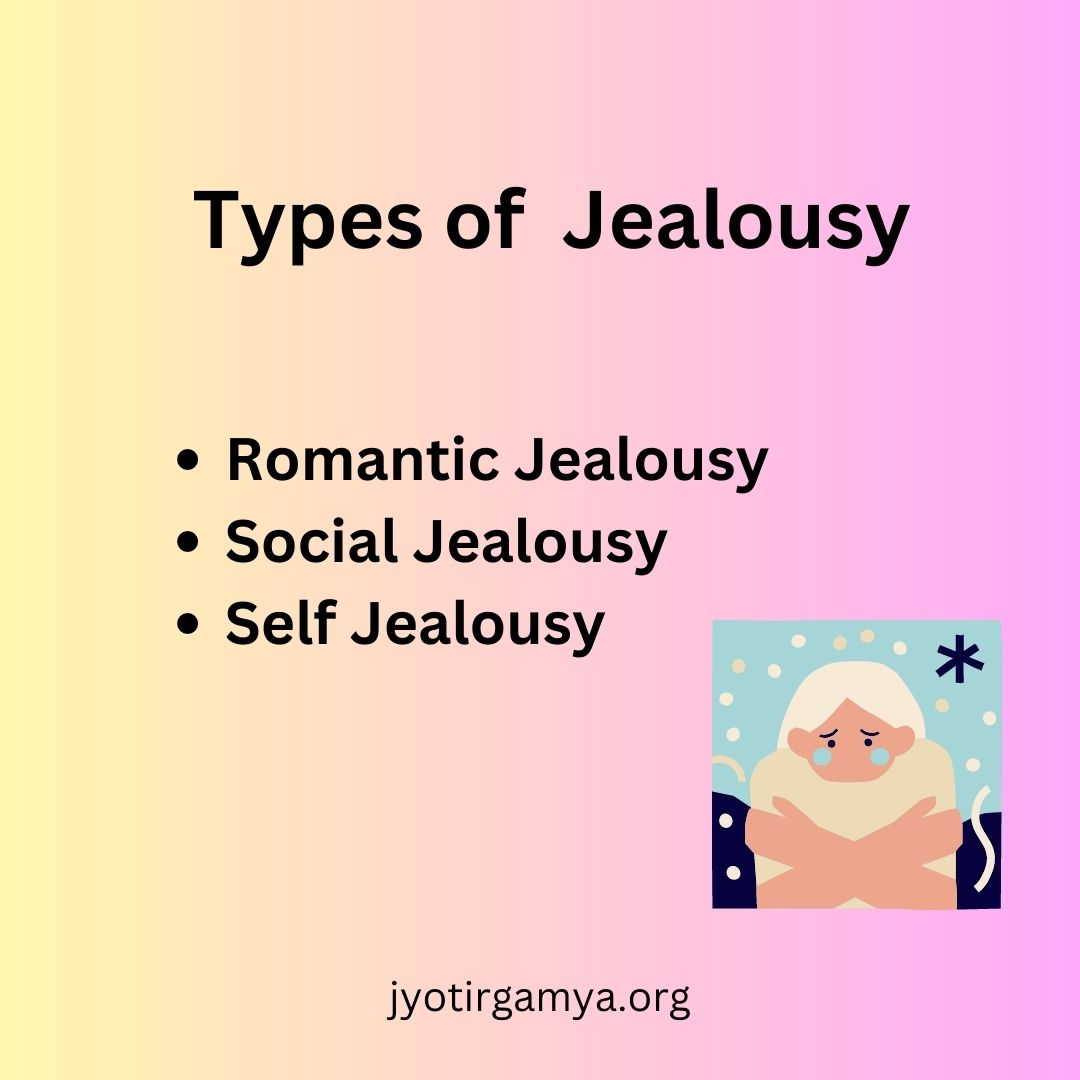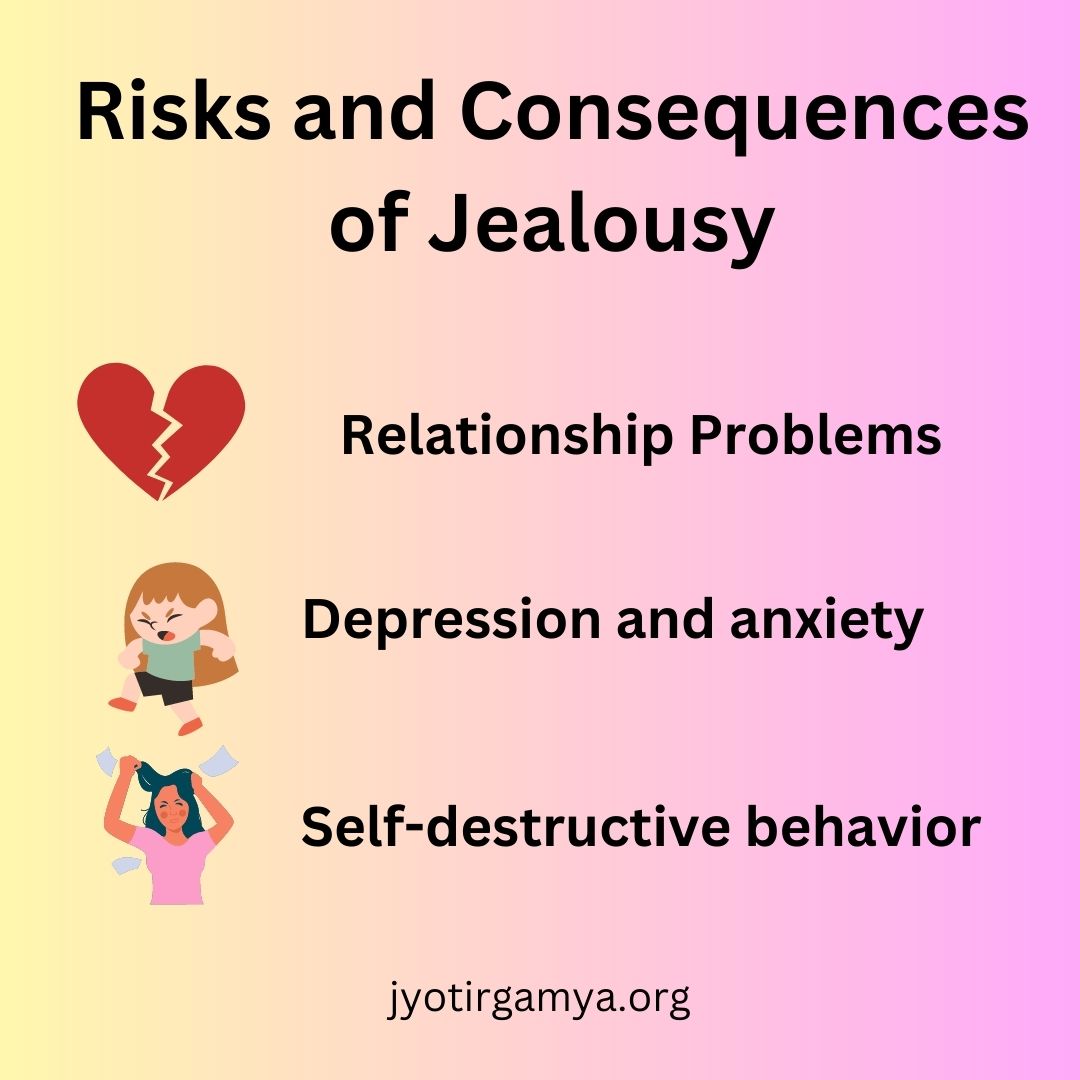How to Deal with Jealousy
Story
Samantha was a mid-aged business executive struggling to keep her business afloat. She approached David, stating business interests, and tried to forge a partnership.
The business could not take off. David took the loss and started afresh. He put all his energy into the new upstart. It took him a while, but he made a decent living. Samantha kept trying things with other partners but failed.
The demon of jealousy would consume every inch of her body. A constant fire kept burning away all her reason leaving hatred, irrational anger, and resentment.
She could not suppress her feelings; with all her claws and fangs, she never missed an opportunity to make things difficult for David or his business.

Initially, she tasted some success with her theatrics, but it is impossible to trick and manipulate people all the time. So gradually, all her ploys started hitting back at her.
Samantha lost all her business and remained perenially frustrated, while David learned the finer nuances of dodging unhealthy competition and kept prospering.
The neighborhood community eventually realized the pretense of the lady. She now had nowhere to hide her face. Time passed, and she died silent, depressed, and sad, suffering till the last second from the self-inflicted pain.
The great Kannada poet and philosopher D. V. Gundappa in his most notable work Mankuthimmana Kagga writes about jealousy, which translates to:

Realizing that the problem of filling up the stomach alone is not enough,
He has kindled the spark of jealousy in a man’s tummy.
A wolf (which is notorious for its hunger) may sleep with a filled stomach,
but, O Man, you start grieving,
looking at others (even after filling yours).
What is Jealousy?
Jealousy is a complex emotion caused by various factors, including insecurity, fear of loss, and possessiveness. It can manifest in various ways, including anger, sadness, and anxiety. Jealousy is the byproduct of our discontentment. When we start comparing our shortcomings to the success of others, we fail to see the good things in our lives and enter into a vicious circle where we intend to create trouble for others but get trapped in our misdeeds.
In this article, we interview experts to arrive at pointers on acknowledging and dealing with jealousy to live a more productive life for self and peers.
Causes of Jealousy

Many different factors can contribute to jealousy, including:
Insecurity: People who are insecure about themselves may be more likely to feel jealous of others.
Fear of loss: People afraid of losing their partner or loved one may be more likely to feel jealous of others they perceive as threatening.
Possessiveness: People who are possessive of their partner or loved one may be more likely to feel jealous of others they perceive as threatening.
Types of Jealousy

There are three main types of jealousy:
Romantic jealousy: It is the most common type and occurs when someone feels threatened by a potential romantic rival.
Social jealousy: This type of jealousy occurs when someone feels threatened by someone who they perceive as having more friends, status, or success.
Self-jealousy: This type of jealousy occurs when someone feels envious of someone else’s qualities, possessions, or achievements.
Risks and Consequences of Jealousy

Jealousy can have several adverse risks and consequences, including:
Relationship problems: Jealousy can lead to arguments, fights, and even break-ups.
Depression and anxiety: Jealousy can lead to feelings of sadness, hopelessness, and anxiety.
Self-destructive behavior: Jealousy can lead to self-harm, substance abuse, and other destructive behaviors.
Expert Advice on How to Deal with Jealousy

“Jealousy is a natural, spontaneous emotion experienced when one feels in any relationship, be it a girlfriend-boyfriend relationship. Siblings, friends, or spouses.
For example, a boyfriend may feel jealous of his girlfriend, who gets more attention from others compared to him, or when a girlfriend may feel jealous of losing her boyfriend because of a third person. The person who feels jealousy goes through complex emotions/feelings ranging from suspicion to anger to fear to humiliation.
Jealousy often happens in a romantic relationship where one partner feels insecure about losing the other partner because of another person’s presence. This sense of instinctive jealousy can lead to conflicts in a relationship, and therefore, it would be essential to manage jealousy; otherwise, it can be torturous not only for the person who experiences it but can damage the relationship.
First, if anyone is experiencing jealousy, then it is first essential to recognize the emotion and accept that ‘Yes, I am feeling jealous’ Depending on how secure and comfortable a person feels in discussing the experience of jealousy with the other person and openly admitting the insecurity of losing the loved one so that through open communication any differences in the relationship can be sorted.
If this is not possible, one has to provide self-assurance that if they are essential to the other person, the relationship will stay strong, and if not, it will break. It is better to be in a secure and robust relationship than in a relationship where a person constantly fears losing another person.
It is essential to understand that we may all experience jealousy. Still, the degree to which it varies depends on many factors, like a person’s personality, support system, and coping ability to handle jealousy. Therefore, you need to understand when you experience jealousy and then consciously work on coping, which can either make or break a relationship.”
“Jealousy is a natural emotion. One must first acknowledge it and accept it. This acceptance can lead to more profound questions of the underlying cause - Why?
Assuaging jealousy involves three parts:
Acknowledge the gaps between oneself and the object of jealousy - maybe someone has something we don’t.
Flip the narrative: what can one be grateful for instead? - we have something too!
Find a way to give back to them - maybe we can share what we have and pay it forward.”
“I believe that the first step is to understand that there is no right or wrong way to feel when it comes to jealousy - the feelings may be there, and it would be essential to recognize and address them.
Jealousy can be used to help individuals look at their insecurities and explore why their needs are being unmet. In addition, it can help individuals self-reflect on their actions and thoughts, leading to the “clearing of the air.”
Nevertheless, if not addressed early, jealousy can get out of control and turn into anger and envy. Therefore, if a person is feeling jealous, one will hope that things are addressed promptly so feelings and emotions can return to a calm state as soon as possible.”
“I would think of dealing with jealousy as more of emotional management. The emotion of jealousy or feeling jealous at its very root has a sense of competition. This concept has been conditioned into our mindset since a very young age, the concepts of competition - winning and losing. Though it has value in some spheres, like sports, to encourage performance, its fallouts are many.
The basic concept of competition values results and not effort. This, in turn, affects our self-esteem. If you win, it boosts your confidence, and if you lose, it brings you down.
The concept of jealousy has an inherent state of comparison, which hurts our self-esteem and confidence. It makes a person feel that a lot is not available to them, leading to envy, jealousy, anger, or sadness.
It’s important to reflect and understand which of our emotional needs are unmet, which brings jealousy or envy. I believe the more we understand ourselves, the more confident we get. We can manage our emotions more effectively if we understand this.”
“I think jealousy is one of those emotions that we seek to suppress, and in doing so, we often struggle to be open and honest about how we feel.
There is nothing wrong with a jealous emotion - we simply need to acknowledge it and deal with it openly and honestly - talking about the things that make us jealous is a better way of dealing with it - than pretending it simply doesn’t occur - because that way it will reoccur again and again.”
“Jealousy is evidence of our insecurity and self-doubt (no baby is born with self-doubt) when we learn to believe that another’s opinion or behavior determines our value. It isn’t.
Jealousy is based on wanting something (or someone) that someone else has AND not wanting them to have it. Envy is based on wanting something (or someone) that someone else has, AND it is being Ok that they have it. Envy is a compliment. Jealousy is an attack.”
“As a practitioner, I’d suggest first deconstructing jealousy.
identify the triggers,
identify ‘why’ those triggers make them jealous,
explore their life experiences to understand how they learned to be jealous.
Once those steps are achieved, learn to reconstruct perspectives, coping skills, and self-regulation/management.
As someone who may struggle with jealousy or managing my jealousy, I should explore the root of my jealousy (e.g., low self-esteem, unmet emotional needs, poor relationships with primary caregivers) and identify the contexts in which I get jealous and cannot manage that jealousy."
“Jealousy often stems from past experiences. The negative response often stays in the person’s psyche for a long. Making the person vulnerable and sensitive toward corrections damages competitiveness.
What can we do?
Recognizing your triggers - According to Daniel Siegal, if we identify our SIFT- Sensations, Images, Feelings, and Thoughts we can recognize whether our emotions and the current event are being clubbed with an experience.
Being Compassionate - towards oneself, although accepting and acknowledging being jealous, can often be extremely difficult. As many times feel hopeless, or there might be an inner critic.
Calm Down - taking a few deep breaths before voicing opinions often helps with the triggers to act out impulsively.
Journaling our thoughts - helps us sort out our biases and provides a newer perspective.
Sharing our problems with someone you trust develops a sense of security and provides emotional support for oneself.”
“Jealousy is usually seen as a negative emotion.
It’s essential to know the difference between Envy & Jealousy. Envy is what we feel when we don’t have something the other person has, whereas Jealousy is experienced when we feel threatened to lose something/someone to a third person. Envy may not need a third person, but jealousy does require a third person.
Few things that you can do to address this so it doesn’t harm you or your relationships.
Acknowledge the existence. Please note that you are not your feelings. So when you say, “I am feeling jealous,” instead of “I am jealous,” you are not letting your emotion take charge.
Take a step back and reflect on whether there are any unmet needs. Are you feeling neglected? Are you losing something?
Am I asking for my needs to be met?
Communicate what you are feeling.
If you could speak to someone, try speaking in the following format :
‘I am feeling jealous because_____. When I see _____happening, I feel _________. It is difficult for me to share this, but I hope you can help me with this emotion. I want to be able to.’ "
“Jealousy is a strong emotion. One needs first to understand what causes that jealousy. The next step is to understand how the individual is affected by that jealousy and, as a consequence, what the response actions are those response actions relevant or impulsive without thought. Lastly, is jealousy a recurring pattern or emotion for someone? If so, why?
Based on the responses to all of this, a plan can be created to help the person navigate the jealousy.
Emotions cannot be managed. They can be navigated and worked upon. It is entirely okay to feel jealous. However, we must ensure that jealousy doesn’t take control and affect our actions.”
“Jealousy is the nature of a person to envy another for a quality which they do not possess but find the other person doing it.
Why should we make ourselves jealous of the other? The answer comes with the realization that we do not understand our strengths and weakness; there is a void in our understanding of ourselves.
Look in the mirror and accept the beauty of the person you are looking at; you may be fat, thin, tall, short, dark, fair, or anything else. What you have is a gift that you need to recognize and see your strengths to make the world a better place for you to live in.
The next time you feel jealous of someone, motivate yourself to be a better person for yourself!”
“The first step is to identify triggers for one’s jealousy. Whether it is a promotion of a colleague or a new car a friend bought - what has triggered that feeling of jealousy? Once identified, one may introspect - why was I triggered? Is it because I want that promotion, or do I want that car?
If yes, what have I done so far to get those? If one understands the work that has been put behind someone’s success, it would be easier to pave the way for working towards it rather than feeling unaccomplished and jealous.
Another situation could be where there’s hardly a way to work for, for example, another person’s looks. Introspection here should be more about what makes me happy, what value I can add, and what my niche would be. In the end, it’s all about finding that contentment with yourself. Working towards that may gradually diminish the jealousy towards the outside world.”
Conclusion
Jealousy is a natural emotion that everyone experiences from time to time. It can be triggered by various things, such as seeing someone else with something you want, feeling like you’re being compared to someone else, or feeling like you’re not good enough.
While jealousy is normal, it can be destructive if not managed healthily. Following the tips above, you can learn to manage your jealousy and live a happier, more fulfilling life.
Related Articles :
If you think someone would benefit from the article, please do share it with them.
Want to stay connected? Here’s our twitter.